The atmosphere roller furnace industry stands at the threshold of a decade-long expansion trajectory that promises to reshape thermal processing technology and advanced material manufacturing solutions. The market's journey from USD 294.1 million in 2025 to USD 488.3 million by 2035 represents substantial growth, demonstrating the accelerating adoption of continuous processing systems and controlled atmosphere technology across lithium battery production, graphite material processing, and electrode manufacturing sectors.
The first half of the decade (2025-2030) will witness the market climbing from USD 294.1 million to approximately USD 398.7 million, adding USD 104.6 million in value, which constitutes 54% of the total forecast growth period. This phase will be characterized by the rapid adoption of continuous-type furnace systems, driven by increasing battery production requirements and the growing need for high-throughput thermal processing solutions worldwide. Advanced atmosphere control technologies and automated temperature management will become standard expectations rather than premium options.
The latter half (2030-2035) will witness sustained growth from USD 398.7 million to USD 488.3 million, representing an addition of USD 89.6 million or 46% of the decade's expansion. This period will be defined by mass market penetration of intelligent furnace technologies, integration with comprehensive Industry 4.0 platforms, and seamless compatibility with existing production infrastructure. The market trajectory signals fundamental shifts in how manufacturers approach material sintering and thermal treatment optimization, with participants positioned to benefit from sustained demand across multiple furnace configurations and application segments.
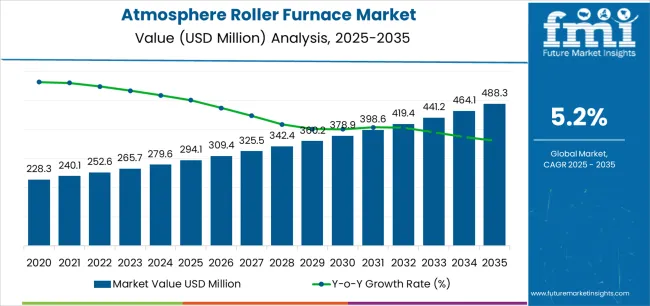
The atmosphere roller furnace market demonstrates distinct growth phases with varying market characteristics and competitive dynamics. Between 2025 and 2030, the market progresses through its battery manufacturing acceleration phase, expanding from USD 294.1 million to USD 398.7 million with steady annual increments averaging 5.2% growth. This period showcases the transition from batch processing systems to continuous atmosphere furnaces with enhanced throughput capabilities and integrated process control becoming mainstream features.
The 2025-2030 phase adds USD 104.6 million to market value, representing 54% of total decade expansion. Market maturation factors include standardization of atmosphere control protocols, declining equipment costs for continuous systems, and increasing manufacturer awareness of thermal processing benefits reaching 99% temperature uniformity in material treatment applications. Competitive landscape evolution during this period features established thermal equipment manufacturers like Suzhou Tanabe and Abbott Furnace expanding their continuous furnace portfolios while specialty producers focus on advanced atmosphere management development and enhanced energy efficiency capabilities.
From 2030 to 2035, market dynamics shift toward smart manufacturing integration and global production standardization, with growth continuing from USD 398.7 million to USD 488.3 million, adding USD 89.6 million or 46% of total expansion. This phase transition centers on AI-powered process optimization, integration with digital factory networks, and deployment across diverse material processing scenarios, becoming standard rather than specialized thermal equipment applications. The competitive environment matures with focus shifting from basic sintering capability to comprehensive production optimization systems and integration with battery manufacturing execution platforms.
| Metric | Value |
|---|---|
| Market Value (2025) | USD 294.1 million |
| Market Forecast (2035) | USD 488.3 million |
| Growth Rate | 5.2% CAGR |
| Leading Furnace Type | Continuous Type |
| Primary Application | Lithium Battery Ternary Materials |
The market demonstrates strong fundamentals with continuous-type furnaces capturing a dominant share through advanced throughput capabilities and operational efficiency characteristics. Lithium battery ternary material applications drive primary demand, supported by increasing electric vehicle production requirements and battery manufacturing capacity expansion needs. Geographic expansion remains concentrated in developed markets with established thermal processing infrastructure, while emerging economies show accelerating adoption rates driven by battery industry development and rising energy storage standards.
Market expansion rests on three fundamental shifts driving adoption across battery manufacturing and advanced material sectors. First, electric vehicle production surge creates compelling operational demand through atmosphere roller furnaces that provide precise thermal treatment without material contamination, enabling manufacturers to meet battery performance standards while maintaining production throughput and reducing processing costs. Second, battery energy density requirements accelerate as manufacturers worldwide seek controlled atmosphere systems that maximize material properties while maintaining thermal uniformity during sintering and electrode material processing operations.
Third, production capacity expansion drives adoption from battery manufacturers and material producers requiring continuous processing capabilities that enhance operational efficiency while maintaining long-term equipment reliability during high-volume manufacturing operations. Growth faces headwinds from capital investment barriers that vary across manufacturers regarding equipment acquisition costs and facility infrastructure requirements, which may limit adoption in smaller battery material producers. Technical complexity challenges also persist regarding atmosphere control precision and temperature profile optimization that may reduce process yield in demanding material specifications, which affect production economics and product quality.
The atmosphere roller furnace market represents a critical battery manufacturing technology opportunity driven by expanding electric vehicle adoption, energy storage deployment, and the need for superior thermal processing precision in electrode material production. As battery manufacturers worldwide seek to achieve 99% temperature uniformity, maximize material throughput, and integrate advanced thermal systems with digital manufacturing platforms, atmosphere roller furnaces are evolving from basic sintering equipment to sophisticated production enablement solutions that ensure material quality and operational efficiency.
The convergence of electric vehicle market growth, battery technology advancement, and thermal processing innovation creates sustained demand drivers across multiple manufacturing segments. The market's growth trajectory from USD 294.1 million in 2025 to USD 488.3 million by 2035 at a 5.2% CAGR reflects fundamental shifts in battery manufacturing requirements and thermal processing optimization.
Geographic expansion opportunities are particularly pronounced in Asia-Pacific markets, where China (7.0% CAGR) and India (6.5% CAGR) lead through aggressive battery manufacturing expansion and electrode material production infrastructure development. The dominance of continuous-type furnace systems (68.0% market share) and lithium battery ternary material applications (48.0% share) provides clear strategic focus areas, while emerging smart furnace technologies and hydrogen atmosphere processing open new revenue streams across diverse thermal treatment markets.
Strengthening the dominant continuous-type segment (68.0% market share) through enhanced production capacity, superior energy efficiency characteristics, automated material handling compatibility, and seamless integration with modern battery manufacturing infrastructure. This pathway focuses on optimizing roller design, improving atmosphere control performance, extending maintenance intervals to 18-24 months, and developing specialized configurations for diverse material processing applications. Market leadership consolidation through advanced thermal engineering, comprehensive process control, and production line integration enables premium positioning while defending competitive advantages against batch processing alternatives. Expected revenue pool: USD 52-68 million
Strategic expansion within intermittent-type technology (32.0% market share) through enhanced flexibility, superior batch control capabilities, and comprehensive process customization for research and specialty material applications. This pathway addresses experimental material requirements, small-batch production needs, and specialized thermal profiles with advanced programmable control for demanding processing standards. Premium positioning reflects process flexibility, research-grade capability, and customization options while enabling access to material research programs and pilot production facility networks. Expected revenue pool: USD 31-40 million
Expansion within the dominant lithium battery ternary material segment (48.0% market share) through specialized NCM cathode processing, high-nickel material optimization, and comprehensive atmosphere control for battery manufacturers. This pathway encompasses precise oxygen control, moisture elimination systems, rapid heating profiles, and compatibility with diverse battery chemistry scenarios. Premium positioning reflects superior material quality outcomes, consistent electrochemical performance, and comprehensive technical support that enables modern battery production while facilitating integration with cathode material synthesis and battery cell assembly systems. Expected revenue pool: USD 62-80 million
Development within graphite negative electrode applications (32.0% share) addressing ultra-high temperature requirements, enhanced graphitization control, and specialized inert atmosphere protocols for anode material processing. This pathway encompasses precise temperature profiling, hydrogen atmosphere compatibility, continuous conveying systems, and advanced cooling zone management for critical applications. Technology differentiation through proprietary heating elements, application-specific atmosphere recipes, and comprehensive thermal validation enables premium pricing while expanding addressable market opportunities across synthetic graphite and silicon-carbon anode manufacturing segments. Expected revenue pool: USD 41-53 million
Rapid battery manufacturing development across China (7.0% CAGR) and India (6.5% CAGR) creates substantial expansion opportunities through local battery manufacturer partnerships, material producer integration, and comprehensive regional service infrastructure development. Growing electric vehicle adoption, energy storage deployment, and battery material production drive sustained demand for thermal processing systems. Localization strategies reduce equipment costs, enable rapid technical support, and position companies advantageously for battery manufacturer procurement programs while accessing growing domestic markets requiring electrode material processing solutions. Expected revenue pool: USD 68-88 million
Integration of sensor networks and process analytics for real-time atmosphere monitoring, predictive maintenance optimization, and comprehensive thermal profile management through intelligent furnace systems. This pathway encompasses IoT connectivity, digital twin integration, automated quality verification, and extensive manufacturing intelligence for processing efficiency enhancement. Premium positioning through digitalization capabilities, process optimization, and comprehensive analytics creates opportunities for service-based revenue models through technology-enabled thermal processing advancement. Expected revenue pool: USD 34-44 million
Primary Classification: The market segments by furnace type into Continuous Type and Intermittent Type categories, representing the evolution from batch thermal processing to advanced continuous flow systems for comprehensive material treatment optimization.
Secondary Classification: Application segmentation divides the market into Lithium Battery Ternary Materials, Graphite Negative Electrode Materials, Positive and Negative Electrode Materials, and Others sectors, reflecting distinct requirements for temperature profiles, atmosphere composition, and processing throughput standards.
Regional Classification: Geographic distribution covers Asia Pacific, Europe, North America, Latin America, and the Middle East & Africa, with developed markets leading adoption while emerging economies show accelerating growth patterns driven by battery manufacturing expansion programs.
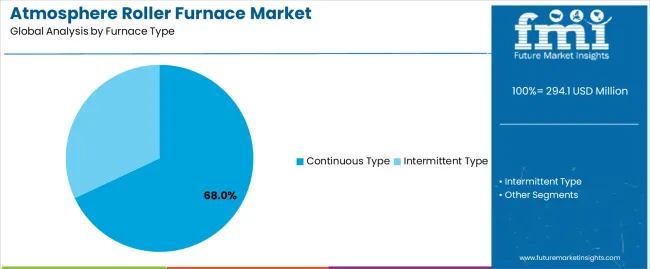
Market Position: Continuous-type furnaces command the leading position in the atmosphere roller furnace market with approximately 68.0% market share through advanced production features, including superior throughput capability, excellent energy efficiency characteristics, and automation compatibility that enable manufacturers to achieve optimal material processing across diverse battery production environments.
Value Drivers: The segment benefits from battery manufacturer preference for high-capacity systems that provide consistent material quality, reduced operational intervention, and continuous production flow without requiring significant process interruptions. Advanced furnace features enable automated material transport, precise atmosphere control, and integration with existing manufacturing lines, where production efficiency and process consistency represent critical battery manufacturing requirements.
Competitive Advantages: Continuous-type systems differentiate through proven throughput capability, consistent thermal profiles, and integration with modern battery manufacturing processes that enhance production effectiveness while maintaining optimal material properties suitable for diverse electrode applications.
Key market characteristics:
Intermittent-type furnaces maintain a significant 32.0% market share in the atmosphere roller furnace market due to their exceptional process flexibility and batch control properties. These systems appeal to research facilities requiring customizable thermal profiles with comprehensive process adjustments for experimental material applications. Market presence is driven by material development laboratories, emphasizing process flexibility and experimental capability through programmable batch processing systems.
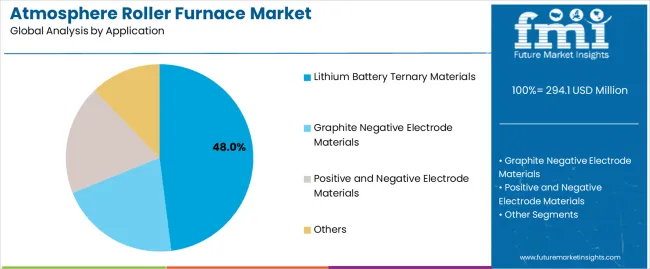
Market Context: Lithium battery ternary material applications dominate the atmosphere roller furnace market with approximately 48.0% market share due to critical cathode material requirements and increasing focus on high-nickel chemistry optimization, electrochemical performance management, and battery energy density applications that minimize processing defects while maintaining battery material standards.
Appeal Factors: Battery material engineers prioritize thermal uniformity, atmosphere purity, and integration with cathode material synthesis infrastructure that enables coordinated processing across multiple production stages. The segment benefits from substantial electric vehicle investment and battery capacity expansion programs that emphasize the acquisition of precision thermal processing systems for cathode material applications.
Growth Drivers: Electric vehicle production programs incorporate ternary cathode materials as standard requirements for high-energy battery cells, while nickel-rich chemistry advancement increases the need for precise sintering capabilities that comply with material specifications and maximize electrochemical performance.
Market Challenges: Varying cathode chemistry compositions and sintering profile requirements may limit process standardization across different battery manufacturers or material formulations.
Application dynamics include:
Graphite negative electrode material processing captures approximately 32.0% market share through high-temperature graphitization requirements in anode production, synthetic graphite manufacturing, and specialized carbon material operations. These applications demand ultra-high temperature furnaces capable of operating in controlled atmospheres while delivering exceptional thermal uniformity and material purity characteristics.
Combined electrode material processing accounts for approximately 14.0% market share, including integrated cathode-anode facilities, multi-material production lines, and specialized coating applications requiring versatile thermal processing for comprehensive electrode manufacturing optimization.
Growth Accelerators: Electric vehicle market expansion drives primary adoption as atmosphere roller furnaces provide continuous cathode material processing capabilities that enable battery manufacturers to meet production volume objectives without compromising material quality, supporting energy density and cost reduction missions that require high-throughput thermal equipment. Battery energy density advancement accelerates market expansion as manufacturers seek precise atmosphere control that maximizes material performance while maintaining thermal uniformity during sintering and electrode material calcination scenarios. Battery manufacturing investment increases worldwide, creating sustained demand for continuous processing systems that complement traditional batch furnaces and provide operational flexibility in complex production environments.
Growth Inhibitors: Capital investment requirements vary across battery manufacturers regarding equipment acquisition costs and facility infrastructure modifications, which may limit operational flexibility and market penetration in regions with financing constraints or smaller-scale material operations. Process optimization complexity persists regarding atmosphere composition fine-tuning and temperature profile development that may reduce initial yield rates in new material formulations, affecting production economics and market adoption speed. Market fragmentation across multiple battery chemistry types and proprietary material specifications creates process customization needs between different manufacturer requirements and standardized furnace capabilities.
Market Evolution Patterns: Adoption accelerates in lithium battery manufacturing and electrode material production sectors where throughput requirements justify continuous processing investments, with geographic concentration in developed markets transitioning toward mainstream adoption in emerging economies driven by battery manufacturing infrastructure expansion and electric vehicle market growth. Technology development focuses on enhanced atmosphere control precision, improved energy efficiency optimization, and integration with digital monitoring platforms that maximize processing quality and production economics. The market could face disruption if alternative electrode manufacturing methods or solid-state battery technologies significantly change material processing requirements in battery production applications.
The atmosphere roller furnace market demonstrates varied regional dynamics with Growth Leaders including China (7.0% CAGR) and India (6.5% CAGR) driving expansion through battery manufacturing infrastructure development and electrode material production network growth. Steady Performers encompass Germany (6.0% CAGR), Brazil (5.5% CAGR), and United States (4.9% CAGR), benefiting from established battery manufacturing industries and advanced thermal processing technology adoption. Mature Markets feature United Kingdom (4.4% CAGR) and Japan (3.9% CAGR), where specialty material applications and precision-focused processing support consistent growth patterns.
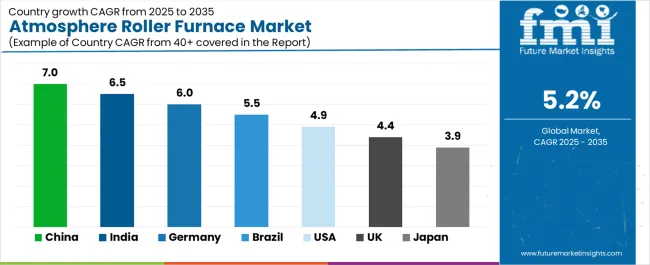
| Country | CAGR (2025-2035) |
|---|---|
| China | 7.0% |
| India | 6.5% |
| Germany | 6.0% |
| Brazil | 5.5% |
| United States | 4.9% |
| United Kingdom | 4.4% |
| Japan | 3.9% |
Regional synthesis reveals Asia-Pacific markets leading adoption through battery manufacturing capacity expansion and electrode material production infrastructure development, while European countries maintain steady growth supported by electric vehicle adoption advancement and thermal processing technology standardization requirements. North American markets show moderate growth driven by domestic battery manufacturing applications and energy storage system integration trends.
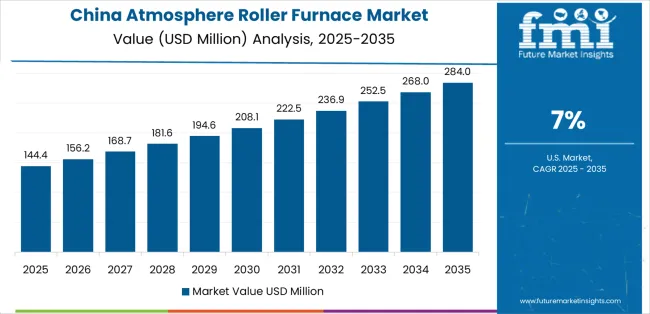
China establishes high-growth leadership through rapid battery manufacturing expansion and comprehensive electrode material production development, integrating atmosphere roller furnaces as standard thermal processing equipment in cathode material and anode production installations. The country's 7.0% CAGR reflects electric vehicle initiatives promoting battery manufacturing capability and material production quality standards that mandate the use of continuous thermal processing systems in battery material and energy storage operations. Growth concentrates in major battery manufacturing centers, including Ningde, Changzhou, and Shenzhen, where cathode material production showcases integrated continuous furnace systems that appeal to battery manufacturers seeking advanced thermal processing capabilities and production efficiency solutions.
Chinese thermal equipment manufacturers are developing cost-effective furnace systems that combine competitive pricing advantages with improved atmosphere control features, including enhanced temperature uniformity and automated process monitoring. Distribution channels through battery manufacturer partnerships and material producer networks expand market access, while technical training programs for thermal processing optimization support adoption across diverse lithium battery material and electrode manufacturing segments.
Strategic Market Indicators:
In Bangalore, Pune, and industrial centers, battery material producers and cathode manufacturers are implementing atmosphere roller furnaces as standard processing equipment for material sintering and quality optimization, driven by increasing battery production capacity and industrial development programs that emphasize the importance of thermal processing capabilities. The market holds a 6.5% CAGR, supported by expanding battery manufacturing base and material production advancement initiatives that promote continuous thermal systems for battery material and electrode component applications. Indian manufacturers are adopting continuous-type furnaces that provide production efficiency and process consistency, particularly appealing in battery manufacturing hubs where material throughput and quality standards represent critical operational requirements.
Market expansion benefits from growing battery manufacturing capabilities and international technology partnerships that enable domestic production of thermal processing equipment for material and electrode applications. Technology adoption follows patterns established in electric vehicle manufacturing, where production quality and processing efficiency drive equipment investments and capability development.
Market Intelligence Brief:
Battery market in Germany demonstrates robust manufacturing capability with documented processing effectiveness in cathode material production and electrode manufacturing through established quality infrastructure. The country leverages thermal engineering expertise and precision manufacturing capability to maintain a 6.0% CAGR. Battery material facilities, including eastern Germany battery valley, showcase furnace implementations where advanced thermal systems integrate with comprehensive quality management programs and production control platforms to optimize manufacturing effectiveness.
German battery manufacturers prioritize thermal uniformity and atmosphere control precision in equipment selection, creating demand for advanced systems with comprehensive monitoring features, including multi-zone temperature control and atmosphere analysis capabilities. The market benefits from established automotive manufacturing infrastructure and willingness to invest in quality-enhancing thermal technologies that provide processing benefits and compliance with automotive battery quality standards.
Market Intelligence Brief:
Brazil's market expansion benefits from growing battery production capacity, including manufacturing development in São Paulo region, electrode material infrastructure advancement, and automotive electrification programs that increasingly require thermal processing for battery applications. The country maintains a 5.5% CAGR, driven by battery manufacturing growth and increasing recognition of thermal processing quality benefits, including material consistency and production efficiency capabilities.
Market dynamics focus on cost-effective furnace solutions that balance processing performance with affordability considerations important to Brazilian manufacturers. Growing electric vehicle adoption creates sustained demand for atmosphere roller furnaces in battery manufacturing infrastructure and material production development projects.
Strategic Market Considerations:
The USA market emphasizes advanced thermal technologies, including process simulation optimization and integration with comprehensive manufacturing execution platforms that handle production scheduling, quality tracking, and energy management applications through unified battery manufacturing systems. The country holds a 4.9% CAGR, driven by domestic battery manufacturing development and energy storage deployment that support thermal processing technology integration. American battery manufacturers prioritize operational efficiency with furnace systems delivering consistent material quality through advanced atmosphere control and automated process management capabilities.
Technology deployment channels include automotive battery manufacturers, cathode material producers, and thermal equipment distributors that support professional applications for high-volume battery material processing requirements. Manufacturing execution system integration capabilities with established production platforms expand market appeal across diverse operational requirements seeking quality and efficiency benefits.
Performance Metrics:
In Coventry, Birmingham, and manufacturing centers, British battery material facilities and research institutions are implementing advanced atmosphere roller furnaces to enhance processing capabilities and support modern material development operations that align with battery technology standards and quality requirements. The UK market holds a 4.4% CAGR, driven by battery technology research and material processing optimization that emphasize precision thermal equipment for advanced battery material and research facility applications. British manufacturers are prioritizing furnace systems that provide process consistency while maintaining operational flexibility, particularly important in research operations and pilot-scale production facilities.
Market expansion benefits from battery research culture that mandates thermal processing precision capabilities in material development specifications, creating sustained demand across the UK's battery research and material manufacturing sectors, where thermal uniformity and atmosphere control represent critical requirements. The quality framework supports advanced thermal processing adoption through research standards and material requirements that promote validated furnace systems aligned with battery development specifications.
Strategic Market Indicators:
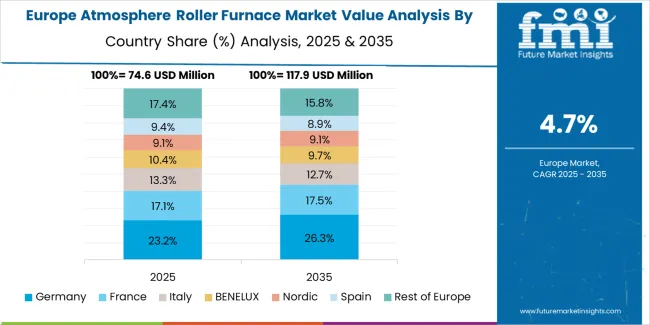
The European atmosphere roller furnace market is projected to grow steadily over the forecast period. Germany is expected to maintain its leadership position with a 32.4% market share in 2025, supported by its advanced battery manufacturing infrastructure and major material production networks across eastern Germany battery manufacturing regions.
France follows with a 26.8% share in 2025, driven by comprehensive electric vehicle programs and battery manufacturing development initiatives. Spain holds an 18.6% share in 2025 through battery material advancement and thermal processing infrastructure modernization. The United Kingdom commands a 14.2% share, while Italy accounts for 8.0% in 2025. The Rest of Europe region is anticipated to maintain momentum attributed to increasing battery manufacturing in Nordic countries and emerging Eastern European material producers implementing thermal processing technology programs.
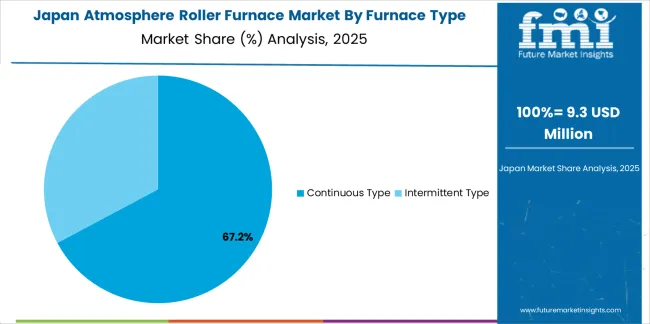
In Japan, the atmosphere roller furnace market prioritizes continuous-type systems, which capture the dominant share of battery material production and electrode manufacturing installations due to their advanced features, including superior production efficiency and seamless integration with existing manufacturing infrastructure. Japanese manufacturers emphasize quality, process consistency, and long-term operational reliability, creating demand for continuous furnaces that provide consistent thermal processing capabilities and adaptive performance based on material requirements and production specifications. Other furnace types maintain secondary positions primarily in research applications and specialty material installations where batch processing meets operational requirements without compromising thermal control.
Market Characteristics:
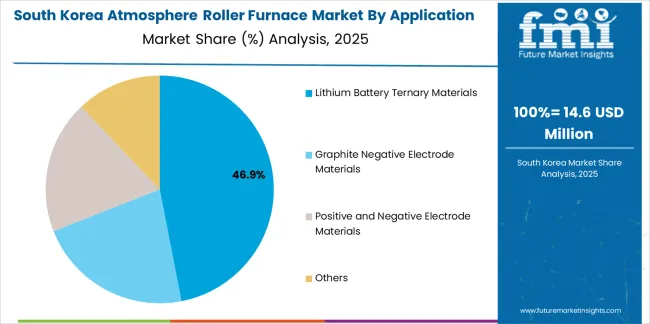
In South Korea, the market structure favors international atmosphere roller furnace manufacturers, including SECO, Abbott Furnace, and Surface Combustion, which maintain dominant positions through comprehensive product portfolios and established battery manufacturer networks supporting cathode material production and electrode manufacturing installations. These providers offer integrated solutions combining precision thermal processing with professional engineering services and ongoing technical support that appeal to Korean battery manufacturers seeking reliable production systems. Local thermal equipment suppliers capture a moderate market share by providing localized technical support and competitive pricing for standard production installations, while domestic manufacturers focus on specialized applications and cost-effective solutions tailored to Korean battery manufacturing characteristics.
Channel Insights:
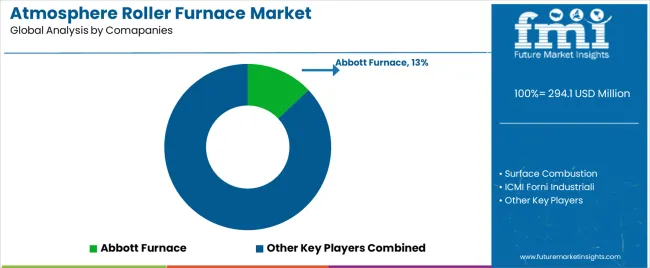
The atmosphere roller furnace market operates with moderate concentration, featuring approximately 18-22 meaningful participants, where leading companies control roughly 48-54% of the global market share through established battery manufacturer relationships and comprehensive thermal equipment portfolios. Abbott Furnace maintains a leading position with approximately 13.0% market share through extensive thermal processing expertise and global battery manufacturing network operations. Competition emphasizes thermal uniformity, atmosphere control precision, and technical support rather than price-based rivalry.
Market Leaders encompass Abbott Furnace, SECO, and Surface Combustion, which maintain competitive advantages through extensive thermal engineering expertise, global battery manufacturer networks, and comprehensive process development capabilities that create customer loyalty and support premium pricing. These companies leverage decades of thermal processing experience and ongoing technology investments to develop advanced furnace systems with precision temperature control and atmosphere management features.
Technology Innovators include Suzhou Tanabe Thermal Energy Technology, Guangdong Zhongpeng New Energy Technology, and ICMI Forni Industriali, which compete through specialized battery material focus and innovative energy efficiency designs that appeal to manufacturers seeking advanced processing capabilities and reduced operational costs. These companies differentiate through rapid customization capabilities and specialized lithium battery application focus.
Regional Specialists feature companies like Changsha Mining and Metallurgy Research Institute, Luoyang Juxing Kiln, and Jiangsu Qianjin Furnace Equipment, which focus on specific geographic markets and specialized applications, including custom furnace development and research-grade thermal processing. Market dynamics favor participants that combine reliable thermal performance with comprehensive technical support, including process optimization services and material testing capabilities. Competitive pressure intensifies as traditional thermal equipment manufacturers expand into battery material processing, while specialized battery equipment companies challenge established players through digital monitoring integration and AI-powered process optimization solutions targeting modern battery manufacturing segments.
| Item | Value |
|---|---|
| Quantitative Units (2025) | USD 294.1 million |
| Furnace Type | Continuous Type, Intermittent Type |
| Application | Lithium Battery Ternary Materials, Graphite Negative Electrode Materials, Positive and Negative Electrode Materials, Others |
| Regions Covered | Asia Pacific, Europe, North America, Latin America, Middle East & Africa |
| Countries Covered | China, India, Germany, Brazil, United States, United Kingdom, Japan, and 25+ additional countries |
| Key Companies Profiled | Suzhou Tanabe Thermal Energy Technology, Guangdong Zhongpeng New Energy Technology, Changsha Mining and Metallurgy Research Institute, Luoyang Juxing Kiln, Jiangsu Qianjin Furnace Equipment, Abbott Furnace |
| Additional Attributes | Dollar sales by furnace type and application categories, regional adoption trends across Asia-Pacific, Europe, and North America, competitive landscape with thermal equipment manufacturers and battery processing system suppliers, manufacturer preferences for thermal uniformity and atmosphere control precision, integration with battery manufacturing platforms and quality management systems, innovations in energy efficiency and process automation technologies, and development of technical services with enhanced process optimization support and material testing capabilities. |
The global atmosphere roller furnace market is estimated to be valued at USD 294.1 million in 2025.
The market size for the atmosphere roller furnace market is projected to reach USD 488.3 million by 2035.
The atmosphere roller furnace market is expected to grow at a 5.2% CAGR between 2025 and 2035.
The key product types in atmosphere roller furnace market are continuous type and intermittent type.
In terms of application, lithium battery ternary materials segment to command 48.0% share in the atmosphere roller furnace market in 2025.






Full Research Suite comprises of:
Market outlook & trends analysis
Interviews & case studies
Strategic recommendations
Vendor profiles & capabilities analysis
5-year forecasts
8 regions and 60+ country-level data splits
Market segment data splits
12 months of continuous data updates
DELIVERED AS:
PDF EXCEL ONLINE
Modified Atmosphere Packaging Equipment Market Size and Share Forecast Outlook 2025 to 2035
Roller Press Gear Units Market Size and Share Forecast Outlook 2025 to 2035
Roller Sports Product Market Size and Share Forecast Outlook 2025 to 2035
Grain Roller Market Size and Share Forecast Outlook 2025 to 2035
Paint Rollers Market Size and Share Forecast Outlook 2025 to 2035
Single Roller Cone Bits Market Size and Share Forecast Outlook 2025 to 2035
Baby Strollers & Prams Market Size & Demand 2024-2034
CNC Controller Market Size and Share Forecast Outlook 2025 to 2035
PID Controller Market Size and Share Forecast Outlook 2025 to 2035
Friction Roller Conveyor Market Size and Share Forecast Outlook 2025 to 2035
Microcontroller Unit Market Size and Share Forecast Outlook 2025 to 2035
Microcontroller Socket Market – Trends & Forecast 2025 to 2035
Door Controller Systems Market
Oilfield Roller Chain Market
Robot Controller, Integrator and Software Market Size and Share Forecast Outlook 2025 to 2035
Composite Roller Market Size and Share Forecast Outlook 2025 to 2035
Touch Controller IC Market Size and Share Forecast Outlook 2025 to 2035
AC-DC Controller Market Size and Share Forecast Outlook 2025 to 2035
Automotive Roller Bearing Market Size and Share Forecast Outlook 2025 to 2035
Industrial Roller Iron Market Size and Share Forecast Outlook 2025 to 2035

Thank you!
You will receive an email from our Business Development Manager. Please be sure to check your SPAM/JUNK folder too.
Chat With
MaRIA